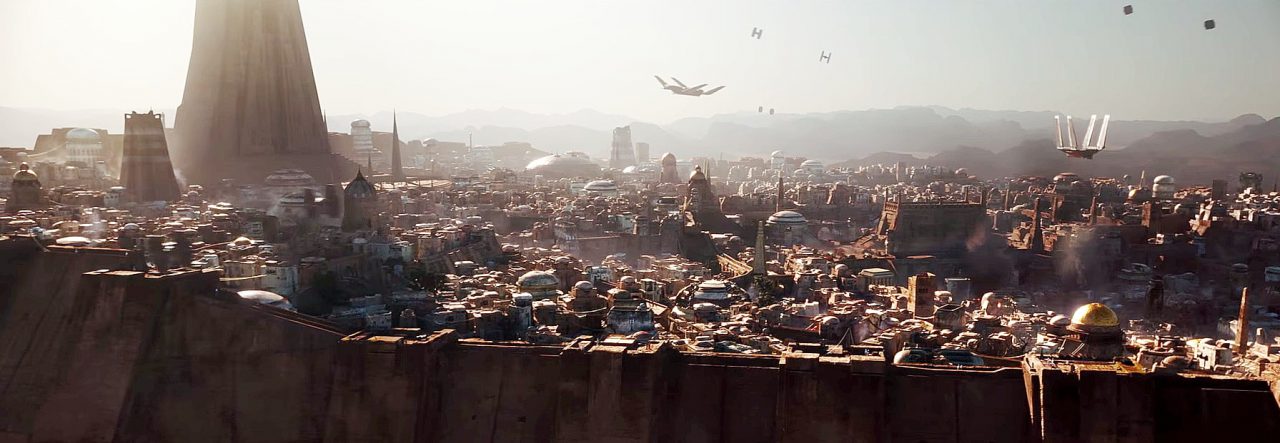
Warning: Major SPOILERS ahead for The Rise of Skywalker.
In his acceptance speech for the Irving G. Thalberg Memorial Award in 1991, George Lucas stated, “I’ve always tried to be aware of what I say in my films because all of us who make motion pictures are teachers. Teachers with very loud voices.”
This quote stayed with me ever since I heard it. As an independent filmmaker, it inspired me to focus on the types of stories I want to tell. As a professional counselor, it was easy to connect the quote to Albert Bandura’s Social Learning Theory and George Gerbner and Larry Gross’ Cultivation Theory. It makes sense that Lucas feels this way about his work because he has always maintained that Star Wars is for kids. In making movies for children, he wanted to be careful about what he was teaching them.
Although George Lucas is sadly no longer involved creatively in the Disney Star Wars films, I appreciate that the films continue the tradition of exploring relevant themes. And I believe The Rise of Skywalker, unlike the saga itself, has a deeply compelling message about family. In family and group therapy sessions, I’m often talking about what defines a family. When I work with clients to create genograms, it is often an exercise of self-discovery. Particularly, individuals notice patterns in their family history that they had not seen or thought about before. Recognition of family trends, relationship dynamics, and how certain traits get passed down from one generation to another can help people develop a deeper understanding of how their early life experiences shaped them.
Furthermore, genograms can help motivate people to live the lives they want. One person may see destructive behaviors and cycles of abuse in their family that they want to end, while another might see how distant and disconnected they’ve become from the supportive family that raised them.
We are not doomed to repeat the wrongs of the past. We have a choice to be something else. To me, this is the message of The Rise of Skywalker. Kylo Ren/Ben Solo and Rey are descendants of Sith Lords, and both of them are fighting their destinies in different ways (I still wish a different actor played Kylo/Ben, but that’s another discussion for another time). Sheev Palpatine, also known as Darth Sidious, plays a critical role in the family history for both characters: Not only is he the man who seduced Ben’s grandfather to the Dark Side, but he is also Rey’s grandfather! I knew Rey being a Palpatine was a popular theory among many fans, but I’m honestly surprised that J.J. Abrams took this route. I had personally hoped for Rey to being a Kenobi, but as I watched the big reveal unfold in The Rise of Skywalker, I realized how much more moving this narrative is.
Lucas described Palpatine as representing the devil. Ian McDiarmid, the actor who portrays Palpatine, took it further and stated the character is worse than Satan. In this sense, Rey is literally the granddaughter of the devil, the purest form of evil. I loved the dynamic of a Sith-inspired Skywalker versus a Jedi-driven Palpatine. On one end, there’s Kylo, who is fighting against the pull towards the light, and on the other, there’s Rey, who is consistently being tempted by the darkness in her.
I’m going to take a quick detour here because it’s worth making some deep cuts. I promise it connects to my point about family! For the uninitiated, there has been a theory for a long time that Palpatine is technically Anakin’s father based on a couple of sources: (1) George Lucas’ original draft for Revenge of the Sith and (2) a recent Darth Vader comic book published by Marvel. In the book, “The Making of Star Wars: Revenge of the Sith,” an original draft of Lucas’ script shows Palpatine/Darth Sidious revealing to Anakin that he “arranged” for his conception. Sidious says, “I used the power of the Force to will the midichlorians to start the cell divisions that created you.” The Marvel comic book seems to confirm the claim that since Palpatine learned from his Sith master, Darth Plagueis, how to manipulate midichlorians to create life, he used this power to impregnate Shmi Skywalker to create Anakin. The problem with this theory is that it’s heavily disputed. Lucas’ original draft for Revenge of the Sith is just that: a first draft, not canon. Moreover, the Marvel comic book does not definitively state that Palpatine is Anakin’s father; in fact, the illustrations indicate that Shmi Skywalker was already pregnant prior to Palpatine intervening. One fascinating theory argues that The Force itself created Anakin in retaliation to Palpatine’s efforts to manipulate midichlorians. In any case, I admit it’s super fun to consider the possibility that Palpatine is Kylo Ren’s great-grandfather in addition to being Rey’s grandfather!
Whether Palpatine is related to both Ben and Rey, or just to Rey, my point is, people are not destined to become their parents if they don’t want to. Anyone who works in family therapy knows that breaking toxic and destructive patterns is not an easy task. We inherit things from our past, and while we are not guilty of committing the wrongs that may exist, we must take responsibility for what we choose to do with what we’ve inherited. This is not just relevant from a family systems perspective, but also through a social justice lens. Rey clearly has Force powers that she inherited from Palpatine and I’m not just talking about the Force lightning. Her ability to manipulate midichlorians to create life (ok, fine: “heal”) comes from Palpatine, who learned it from Darth Plagueis (by the way, I love how important the prequels are to this movie!). What she chooses to do with her power is what contributes to determining her destiny, and I think she realizes this when she thought she inadvertently killed Chewbacca (and thank God she didn’t because it was “Vector Prime” all over again for me!). In an article about privilege, the author Jamie Utt quotes a mentor: “If we inherit injustice, we should never feel guilty. We are not responsible for that past. However, if we choose to do nothing about it going forward, then we have plenty to feel guilty about.”
The Rise of Skywalker is being criticized for not taking risks, but I would argue that the film’s ending is an interesting subversion of the saga’s view of bloodlines. When Luke declared to Palpatine in Return of the Jedi that he is a Jedi “like my father before me,” he proudly embraces his heritage as a Skywalker. After all, in a spiritual sense, it is Anakin Skywalker who is Luke’s father, not Darth Vader. Rey, on the other hand, is not a Skywalker by blood, but rather adopts the name. She rejects her “birthright” to the throne her grandfather offered. I’m surprised that I’ve heard some fans complain that Rey cannot be a Skywalker because she is not blood-related to Luke or Leia. But what The Rise of Skywalker does so beautifully is that it challenges conventional definitions of family. Family is not always about who you’re related to by blood, but rather about people you choose; people who accept and embrace you as who you are. And who you are is who you choose to be.
As Leia says to Rey, “Never be afraid of who you are.”
